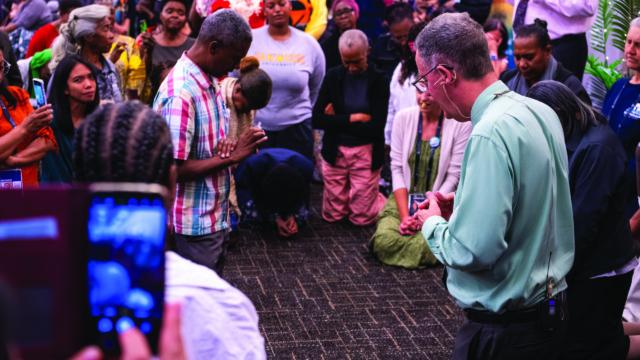… My Lord and my God!
(John 20:28)
Merriam-Webster Dictionary defines “identity” as the distinguishing character or personality of an individual1 that is also, by definition, “individuality.” Etymologically speaking, we find the word’s origin in the Latin idem, rendered as the same or sameness.2 It is captivating how the language and the meaning of words change with time. This change is vital to our reflection on the steward’s identity.
In today’s world, people look at their identities in many ways. People and organizations have their personal, cultural, national, and religious distinctive identification, names, logos, language, ethics, culture, ethos, etc. While we speak of our world as the “global village,” we all want to be unique and distinct. Identity connects people just as much as it separates them.
When we speak of the steward’s identity, we should see it as “the same as the Lord” rather than “distinguished from the Lord.” The steward should have the identity or similitude in the Lord and not in anyone or anything else (2 Cor. 5:17). The local church’s needs and priorities could alter, organizational leaders could move on, social and religious practices could be swayed into a new direction, and if, as stewards, our identity and loyalty are found in any of the above, our faithfulness to the Lord will also vary.
In the parable of the Talents or the Unprofitable Servant of Matthew 25:14-30, we find three servants who were entrusted with the master’s property and who received a commission to grow his economy and wealth in his absence. Two were saturated with their master’s identity and his will and became highly successful and productive. While the unprofitable servant exclaimed, “Lord, I knew you to be a hard man,” (Matt. 25:24) disagreeing with the essence of his master and rejecting to identify with him. His identity crisis was manifested in egotism, arrogance, and selfishness, resulting in laziness, disobedience, unfaithfulness, and uselessness.
Speaking of servants growing the kingdom under challenging times, Ellen G. White explains: These will not be talking of self, vindicating self, but will lose their identity in Jesus Christ … All pride must perish, all jealousy be overcome, all ambition for supremacy be given up, and the meekness and trust of the child be encouraged.3
A steward only responds through service and gives what one has already received. The grace of being a steward of the master’s affairs is, in itself, the most exceptional honor a servant could have. Living in the master’s house, attending the master’s business, and handling his economy are the wealth of gifts the steward receives to express the most profound gratitude through investing.
LeRoy Froom explained this bond as: … the greatest needs of the hour, next to the outpouring of the Holy Spirit, is for the remnant church to have a new vision of God’s ownership and man’s stewardship.4 This new vision of God’s ownership will bring the proper identity to every servant entrusted with the master’s gifts. All those who have accepted Christ’s Lordship become stewards of the “manifold grace of God” (1 Peter 4:10), despite one’s economic, intellectual, social, and material properties.
However, the suppressed reality could be that, as Christians, we could perceive the church body as the lord. Ben Maxon noted, Most spiritual problems come from either a failure to integrate the gospel into our life or to accept the lordship of Jesus Christ.5 Having Christ as the Lord of the steward resolves spiritual problems, brings solutions, and answers questions due to the Lord’s greatness! We can not be stewards without a Lord. The question remains, do we fully identify with the Lord?
In Part 3 of the series, we will examine the awe-inspiring nature of the steward’s Lord, the Lordship of Jesus Christ, in whom we find the meaning of stewardship.
—Anton Kapusi is the lead pastor of Pueblo First Seventh-day Adventist Church. Photo by Pexels.
1 Merriam-Webster. Identity. In Merriam-Webster.com Dictionary. https://www.merriam-webster.com/dictionary/introvert
2 Online Etymology Dictionary. Identity. In Online Etymology Dictionary. https://www.etymonline.com/
3 White, E. G. Testimonies, p. 130-1.
4 Froom, L. E. (2012). Stewardship in Its Larger Aspects. Pacific Press Publishing Association – Kindle Edition. 122.
5 Maxon, B. (2010). Get Normal: How Partnering with God Transforms Your Life. Stewardship Ministry Department, General Conference of the Seventh-day Adventist Church. p. 132.




